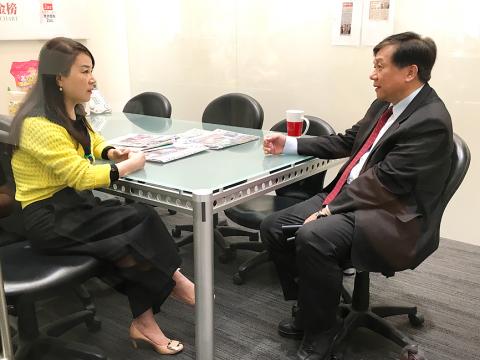Minister of economic affairs-
designate Lee Chih-kung (李世光) yesterday compared the impact of the OBI Pharma Inc (台灣浩鼎) controversy on the nation’s biotechnology industry to a “tsunami.”
OBI Pharma “definitely has an influence” on the biotech industry, Lee said during an interview with radio host Clara Chou (周玉蔻).

Photo: Huang Pei-chun, Taipei Times
“The impact looks like the beginning of a tsunami,” he added.
Lee said it was hard to say how long it would take for the industry to recover from the scandal, sparked by allegations of insider trading and conflict of interest at OBI Pharma, adding that it would depend on public sentiment.
Most developed countries value the biotech industry and understand that it requires long-term investment, he said.
“I am not trying to speak for OBI Pharma. The insider trading and conflict of interest allegations are indeed significant issues, but I think the public should seek the truth and look at the matter rationally,” Lee told reporters after the interview.
Lee declined to comment on Academia Sinica President Wong Chi-huey’s (翁啟惠) role in the case, saying that Wong should explain the matter to the public.
Wong is an internationally renowned academic, Lee said, adding that he does not think Wong’s involvement in the controversy is a “shame.”
However, the scandal and its effect on the public have affected the reputation of Academia Sinica, he said.
Local media reports have also revealed that Lee’s younger brother, Howard Lee (李世仁), is an independent board member of OBI Pharma and a member of Academia Sinica’s research and development results management committee — sparking a new round of speculation about conflict of interest.
C.K. Lee said that his brother’s situation cannot be classified as a conflict of interest, because the committee does not deal with individual companies.
Moreover, his brother does not receive remuneration as committee member, only a transportation allowance of NT$1,000 to NT$2,000 each time, C.K. Lee said.
However, he has asked his brother to consider resigning from OBI Pharma and the committee given his ministry post.
C.K. Lee also confirmed that he has dual citizenship, but said he had submitted an application to the American Institute in Taiwan (AIT) to give up his US citizenship, with an interview scheduled next week.
C.K. Lee, who is to take up his new post on May 20, is to visit Minister of Economic Affairs John Deng (鄧振中) on Monday to talk about the handover, the ministry said.
The 56-year-old said his biggest challenges in his new post would be finding ways to boost economic development, increase wages for young people and attract international talent to Taiwan.
His first task when he assumes office will be to promote development of the green energy sector in Taiwan in the hope of building a demand-oriented industry as soon as possible, Lee said.
He said he will also push for reform of the industrial sector, which has complained of water, electricity, land, and labor shortages.
Lee said he was made aware of the problems during his tour on April 28 of various industrial and commercial enterprises, which also mentioned other problems such as limited access to funding and consultancy services.
Additional reporting by CNA

Application-specific integrated circuit designer Faraday Technology Corp (智原) yesterday said that although revenue this quarter would decline 30 percent from last quarter, it retained its full-year forecast of revenue growth of 100 percent. The company attributed the quarterly drop to a slowdown in customers’ production of chips using Faraday’s advanced packaging technology. The company is still confident about its revenue growth this year, given its strong “design-win” — or the projects it won to help customers design their chips, Faraday president Steve Wang (王國雍) told an online earnings conference. “The design-win this year is better than we expected. We believe we will win

Intel Corp chief executive officer Lip-Bu Tan (陳立武) is expected to meet with Taiwanese suppliers next month in conjunction with the opening of the Computex Taipei trade show, supply chain sources said on Monday. The visit, the first for Tan to Taiwan since assuming his new post last month, would be aimed at enhancing Intel’s ties with suppliers in Taiwan as he attempts to help turn around the struggling US chipmaker, the sources said. Tan is to hold a banquet to celebrate Intel’s 40-year presence in Taiwan before Computex opens on May 20 and invite dozens of Taiwanese suppliers to exchange views

Chizuko Kimura has become the first female sushi chef in the world to win a Michelin star, fulfilling a promise she made to her dying husband to continue his legacy. The 54-year-old Japanese chef regained the Michelin star her late husband, Shunei Kimura, won three years ago for their Sushi Shunei restaurant in Paris. For Shunei Kimura, the star was a dream come true. However, the joy was short-lived. He died from cancer just three months later in June 2022. He was 65. The following year, the restaurant in the heart of Montmartre lost its star rating. Chizuko Kimura insisted that the new star is still down

While China’s leaders use their economic and political might to fight US President Donald Trump’s trade war “to the end,” its army of social media soldiers are embarking on a more humorous campaign online. Trump’s tariff blitz has seen Washington and Beijing impose eye-watering duties on imports from the other, fanning a standoff between the economic superpowers that has sparked global recession fears and sent markets into a tailspin. Trump says his policy is a response to years of being “ripped off” by other countries and aims to bring manufacturing to the US, forcing companies to employ US workers. However, China’s online warriors